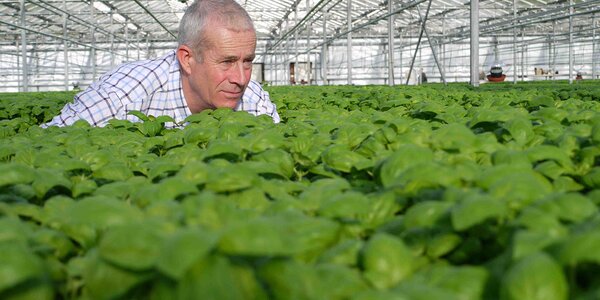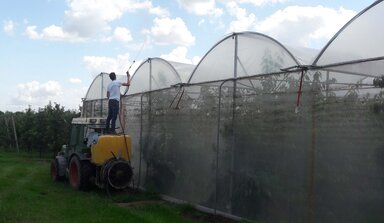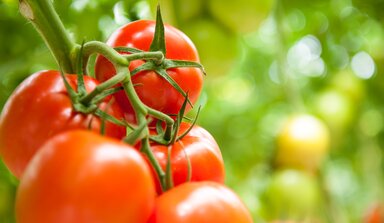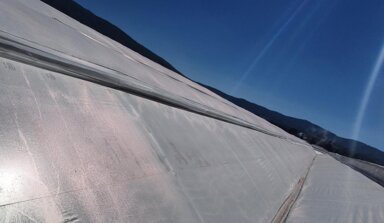VHB and ReduHeat
Good light levels are vital to pot herb production, both for speed of throughput and crop quality, but plants need to be protected, too, from excessive summer temperatures.
VHB’s West End Nursery at Angmering, West Sussex, on the south coast of the UK, has been using the temporary glasshouse coating ReduHeat as a way to shade plants between the end of March and August for the last four years.
Five hectares of the 6ha of glass at West End are dedicated to pot herb production – 11 million pots are grown each year for several of the UK’s leading supermarkets. That means general manager Simon Smith and his 18-strong nursery production team work to demanding production schedules and quality specifications.
“All our production planning is based on knowing how many days are needed from sowing to the finished crop for each type of herb,” says Mr Smith. “Some are particularly light sensitive; for example, a crop of basil takes 36 days in June but 55 in the duller conditions of winter.

Simon Smith
“And for all the herbs, crop quality is very sensitive to light in terms of the plants’ appearance and the influence of different wavelengths on flavour compounds.”
Clearly, any reduction in light levels in summer would have a serious impact on production schedules, which is why the nursery opts for ReduHeat, because it blocks out light at the wavelengths that cause heat to build up without losing too much of the light that the crop needs for growth. “Being able to reduce heat without losing light transmission is especially important in spring and autumn,” says Mr Smith. “Glasshouse screens supplement its effect in the height of summer.”
Pot herbs need a ‘buoyant’ atmosphere so the glasshouse is vented throughout the summer. “The properties of ReduHeat mean we can keep minimum vent in dull weather without losing too much heat because there is still enough solar gain,” says Mr Smith. “The coating also helps prevent the stress the crop can experience when we get extremes of temperature, for example, when we move from dull to bright weather.”
Basil, one of VHB’s biggest lines, tends to scorch under very bright conditions – but if the vents have to be fully opened to cool the glasshouse, the humidity can drop too low for the crop, to around 40% RH rather than the 70% RH Mr Smith aims for. “ReduHeat helps to buffer the temperature, so we don’t have to open the vents so wide and humidity can be maintained,” he says.
Coriander is one crop that really benefits from summer shade. “Too much light makes plants too ‘soft’,” says Mr Smith. “We currently use screens to provide additional shade but I would prefer not to because they can restrict air movement. I understand there may be scope in future to develop coatings that act as spectral filters too. Ideally, we would like to be able to shield light at the wavelengths that induce the plants to stretch, as well as those which cause heat to build up. In the meantime, we are considering using a higher concentration of ReduHeat on the areas of the nursery used to grow coriander as it would mean we could keep the screens open for longer.”
Mr Smith says he’s been really pleased with the consistency ReduHeat offers over the four to five months he uses it. “Compared with coatings I’ve used in the past it breaks down less readily and is less prone to washing off in a rainy summer – yet it’s very easy to remove, with ReduClean, when you want to,” he says.


